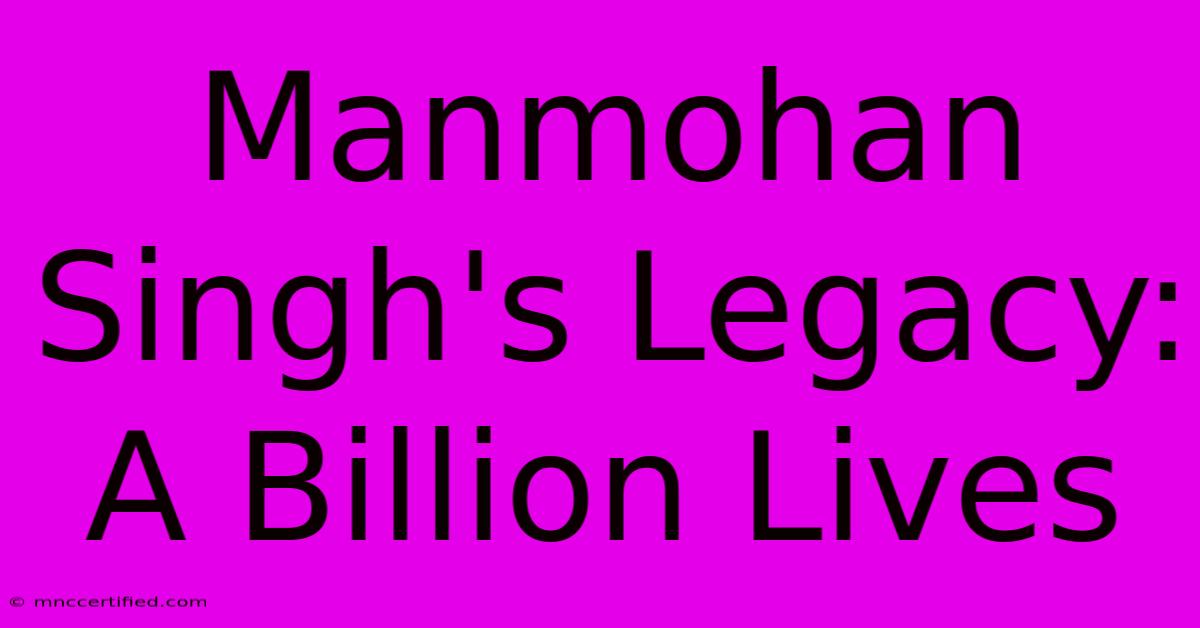Manmohan Singh's Legacy: A Billion Lives

Table of Contents
Manmohan Singh's Legacy: A Billion Lives, Shaped by Reform and Restraint
Dr. Manmohan Singh's tenure as Prime Minister of India (2004-2014) remains a subject of intense debate and analysis. His legacy, however, is undeniably etched into the fabric of modern India, impacting a billion lives through a complex interplay of economic reforms, foreign policy initiatives, and socio-political considerations. This article delves into the multifaceted nature of his leadership, examining both his achievements and criticisms.
The Architect of Economic Liberalization: A Legacy of Reform
Manmohan Singh's pre-Prime Ministerial role as Finance Minister under P.V. Narasimha Rao is inextricably linked to his later achievements. He spearheaded the landmark economic liberalization of 1991, a bold move that shifted India away from a socialist, centrally planned economy towards a more market-oriented system. This economic liberalization laid the foundation for India's subsequent economic growth, a crucial aspect of his enduring legacy.
Key Economic Achievements:
- GDP Growth: Under his leadership, India experienced significant GDP growth, attracting substantial foreign investment and fostering job creation. This period saw a rise in the Indian middle class, dramatically altering the country's social landscape.
- Infrastructure Development: Significant investments were made in infrastructure projects, including roads, power, and telecommunications, which were vital for sustained economic growth and improved quality of life.
- Poverty Reduction: While poverty remained a significant challenge, considerable strides were made in reducing poverty levels, especially in rural areas, due to economic expansion and targeted social programs.
- Fiscal Prudence: Despite pressures to increase spending, Singh largely maintained fiscal discipline, preventing runaway inflation and debt accumulation. This cautious approach, though sometimes criticized for being slow, contributed to macroeconomic stability.
Beyond Economics: Foreign Policy and Social Initiatives
While economic reform dominated his agenda, Manmohan Singh's legacy extends to foreign policy and social initiatives.
Foreign Policy Highlights:
- India-US Nuclear Deal: The landmark nuclear deal with the United States, though controversial, aimed to enhance India's energy security and international standing. It significantly improved bilateral relations and opened new avenues for cooperation.
- Strengthened Regional Ties: Singh's government actively pursued stronger relationships with neighboring countries, seeking to foster regional cooperation and stability.
Social Initiatives and Challenges:
- National Rural Employment Guarantee Act (NREGA): This flagship program aimed to provide employment to rural populations, addressing poverty and enhancing rural livelihoods. It remains a significant social welfare initiative.
- Right to Information Act (RTI): The RTI Act, promoting transparency and accountability, proved pivotal in empowering citizens and fostering good governance.
- Concerns Regarding Corruption: Despite significant achievements, the Singh government faced criticism over allegations of corruption, impacting public trust and its legacy.
Criticisms and Controversies:
While Manmohan Singh's contributions are undeniable, his tenure wasn't without its shortcomings.
- Slow Decision-Making: He was often criticized for a perceived lack of decisiveness and slow implementation of policies. This was attributed, in part, to his coalition government's complexities.
- Handling of Corruption Allegations: The government's response to various corruption scandals, including the 2G spectrum allocation case, drew considerable criticism and eroded public confidence.
- Inflation: Periods of high inflation during his tenure negatively impacted the lives of many ordinary citizens.
Conclusion: A Complex and Enduring Legacy
Manmohan Singh's legacy is multifaceted and complex, a blend of remarkable achievements and significant shortcomings. His role in ushering in economic liberalization fundamentally reshaped India's economic trajectory, impacting billions of lives. While controversies and criticisms undoubtedly exist, his impact on India's economic and political landscape remains profound and continues to be debated and analyzed. His legacy serves as a compelling case study in the challenges and opportunities of economic reform and its impact on a nation's development. The true measure of his leadership will continue to be debated for generations to come.

Thank you for visiting our website wich cover about Manmohan Singh's Legacy: A Billion Lives. We hope the information provided has been useful to you. Feel free to contact us if you have any questions or need further assistance. See you next time and dont miss to bookmark.
Featured Posts
-
Salah On Liverpools Title Hopes This Year Feels
Dec 27, 2024
-
Best Zara Boxing Day 2024 Sales
Dec 27, 2024
-
Seattle Vs Chicago Boxing Day Stream
Dec 27, 2024
-
Charlotte Tilbury Fragrances 11 Each
Dec 27, 2024
-
Nosferatu Remake Death And Ecstasy
Dec 27, 2024